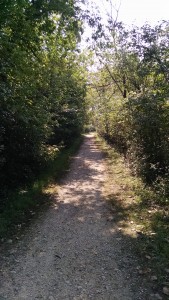I am a few days from my 46th birthday, and some rather unsettling news stories have emerged about my demographic cohort. White Americans aged 45 – 54, in contrast to nearly every demographic group in the US and Europe, have had a significant increase in the death rate in recent years. Much of this has been driven by those with a high school education or less, and admittedly, I don’t fall into that category (I have a bachelor’s degree).
The researchers’ findings indicate a huge spike in causes that sound to me like they are closely related: Alcohol and drug poisoning (accidental and deliberate overdose), Liver failure (likely related to substance abuse) and suicide. People of my age and background have basically given up on reality, the future and – let’s face it – hope.
My earliest political memories are of my parents and other adults talking about “Tricky Dick” Nixon. Distrust of the government is deeply ingrained in many people my age. We’ve been soaked in constant rhetoric about soaring government debt and a fear that the social safety net won’t be in place when we get old. Corporations have now had decades of downsizing, moving jobs to other countries, and slashing worker benefits. Neither government nor employers seem likely to provide a safety net for the years when we will need it.
For many of the people I knew in grade school, family provided no sense of stability or safety. The 70’s were the age of the “latchkey” kids, who came home from school to empty houses while parents were away at work. Parents going through divorce was common, and it often played out in strained and bitter ways. Children today often have “helicopter” parents, who constantly monitor and over-protect their children. Children 35 years ago were often pretty much on their own.
In the last decade, many of the hallmarks of American middle class prosperity have slid into oblivion. Jobs have been harder to come by, and often pay less in real money than they did in the past, particularly for those without higher education. For those of us who bought homes in the early 2000’s, the housing crash gutted the equity, taking a huge bite out of net worth. Ages when we might be eligible for retirement benefits are being pushed back – from 65 to 68 or further. Employers offering pensions are almost unknown today.
Personally, I took a major hit with both income and home value during the most recent recession, and my financial position in 2015 is still far below where it was in 2008. I am in better shape than most, but still, my financial fortunes are not improving, and don’t look likely to do so anytime soon. For those working physically demanding jobs, these prospects must look even dimmer, as age takes its toll on the body and the ability to work will be diminished.
All the things that were supposed to give us stability and prosperity have been sliding away.
Researchers also found a high rate of people in this group reporting constant pain, inability to walk short distances, or socialize with people. Frankly, our quality of life is declining.
So we escape – into drugs, into alcohol, into video games, and TV. The more we escape, the more disengaged we become, and the farther we are from some solutions to make life more fulfilling.
The major news media lies to us to make us angry, reminding us of the “promises” we were fed when we were young and how far we are from those times today. The mass media doesn’t sell empathy – only outrage. And it creates yet another reason to tune out and retreat into our isolated and isolating worlds.
Post-apocalyptic fantasies have been popular for decades now. Mad Max and Terminator are still going strong. Meanwhile Hunger Games-type stories have multiplied and there seems to be a new zombie-infested movie every other week. It seems difficult to imagine a world where the current crises are overcome and a new, sustainable world results. At least to our story-telling mind, our current events will almost certainly lead to a massive disaster and the best we can do is survive.
It’s not at all unusual for my friends to express a desire not to grow old. The idea of not being able to care for yourself, but having no resources or support to depend on is terrifying.
I know a lot of people my age who drink heavily. I’m sure some of them are on their way to join that liver disease statistic. I’m not aware of friends who use heroin, but I know it has become far more common in recent years. I know of many people who don’t take care of their health on the one hand, or people who have serious health issues now and have fairly burdensome health regimes to try to manage it. A heavy regimen of prescription drugs can also lead to liver failure, and pain-killer use is noted as a gateway to opiate abuse.
Perhaps we can say that our group should take better care of their own health, but honestly, poorly educated people don’t have the tools to sort through the nonsense the media feeds them, and the media is full of contradictory and misleading nutrition information. A lot of us live off convenience foods – take out and pre-packaged foods that are high in fat and sodium, low in fiber and micronutrients.
So what is the way out? How do you sell hope to a group that only sees the future as a slide into misery? There’s no golden retirement with golf courses and Caribbean cruises. There’s just working away at a menial job until you’re so sick that someone shoves you into whatever nursing home will take your Medicare and Social Security (if those programs aren’t bankrupt in 25 years).
There are a few pieces of advice for my peers. This is all very imperfect, and every single day, I have to talk myself into this.
Shed Expectations and Entitlements
A big part of why we’re having a rough time, even compared to other groups that are less well off (but still improving), is that we have had expectations set – by parents, by schools, by media.
Supposedly, America won the Cold War and is the world’s only Superpower. We’re supposed to be the wealthiest, freest and most open society in the world. Yet, somehow, incomes are sinking and good jobs are hard to come by. Health care is more expensive than anywhere in the world, but is far from the most effective. We have a massive proportion of our population in prison, and yet we live in the most violent society in the industrialized world.
The country is not on a road to prosperity and we can’t just ride the wave. Resources are shrinking. We depend on finite resources like petroleum, and even though gas prices have eased off the record highs of a few years ago, obtaining fossil fuels will only get more expensive and more environmentally destructive as time goes on. Easily drilled oil is dried up. It only gets harder from now on.
So, let’s be real. The expectation that we’ll live a life better than our parents is gone. What we do with that is up to us. And wasting time moping about how we’re screwed isn’t making anything better.
Build a Better World with Your Own Hands
Learn to cook. Plant a garden. Take up knitting. Do a woodworking project. Take up painting. Build a doghouse. Build a picnic table. Make a quilt. Sew a tote bag. Sew a new shirt. Bake cookies. Learn how to pickle. Learn how to home brew beer.
Make something real and concrete that you or someone you love will enjoy. Do it with your own hands and make it your own. It will probably take practice to get it right.
If you’re more ambitious and/or skilled, fix up your home. Get a do-it-yourself book from the used bookstore and take on a project. And finish it. Take your quality of life into your own hands.
Join Multi-Generational and Multi-Racial/Ethnic Groups
Sometimes, it’s nice to hang around with people who know our pop culture references from childhood, and who know what it was like “back then”. But there’s a huge value in being with people who are older and younger and getting to know their experience. There’s a great value in being with people who have different cultural backgrounds. It gives us perspective about what we have and what we don’t.
Here’s the thing – it’s not valuable if you don’t pay attention to them. Listen. Notice what is different in their perspectives and think about why yours is different. You don’t have to deny who you are or your experience to acknowledge another point of view.
Examples of these kinds of groups are religious and civic groups, volunteer organizations, places where different kinds of people come together for a purpose.
Eat More Vegetables
Seriously, you’ll be happier and healthier. Raw in a salad, roasted, or boiled – they’re full of fiber, vitamins and minerals. Try different ones that you haven’t had in years, or that you never tried. Your adult palate may surprise you. Think you hate Brussels sprouts, but haven’t tried them since you were eight years old? Give them another shot. And, if you can, prepare them yourself. Again, it’s part of taking your health literally into your own hands.
Be Outside in Nature
Stop to smell the flowers – literally, smell the flowers. And feel the tree bark. Watch the squirrels. Listen to the birds chirping. Find a park and walk. If it’s windy or a little cold, find a good jacket. If it’s muddy from the rain, bring out your oldest shoes that you’re not afraid to get dirty. It will connect you to the world that we came from. It provides an experience that no TV or video game can match.
Try a Life-Affirming Religious or Spiritual Practice
Some people meditate. Others try Yoga. Some people try Bible Study. Others volunteer to help those in need. I know it’s not for everyone, but for a lot of people, religious and spiritual practices help their state of mind. I consider myself very lucky to have found a spiritual home in the Brotherhood of the Phoenix.
But without telling you what to believe or what tradition to follow, think of finding one that focuses on now, not that preaches about eternal damnation or waiting for your reward in the beyond. Find a tradition that affirms life, that values our world and the people in it, and strives to improve you and those around you.
Practice Gratitude
Be glad that you have what you do – a home, a family, food, friends. Thank people when they help you. Thank them even if they’re getting paid. Saying those words still means something.
Keep a gratitude journal. This is a great time of year for it, since Thanksgiving is coming up. Take the ten days leading up to Thanksgiving and write about one thing each day that you’re grateful about. A person in your life, an experience that you’ve had, a hobby, a gift – big or small, write it down. Really, this helps. Don’t focus on what you feel life promised you. Don’t focus on what your neighbors have that you don’t. Focus on what you have and know is good and helpful – and feel the gratitude.
I can’t guarantee that any or all of these will pull us out of this spiral, but I hope it’s some kind of basis for hope.
As we say in my tradition,
Ta Kya Te
My Heart is Open to You







